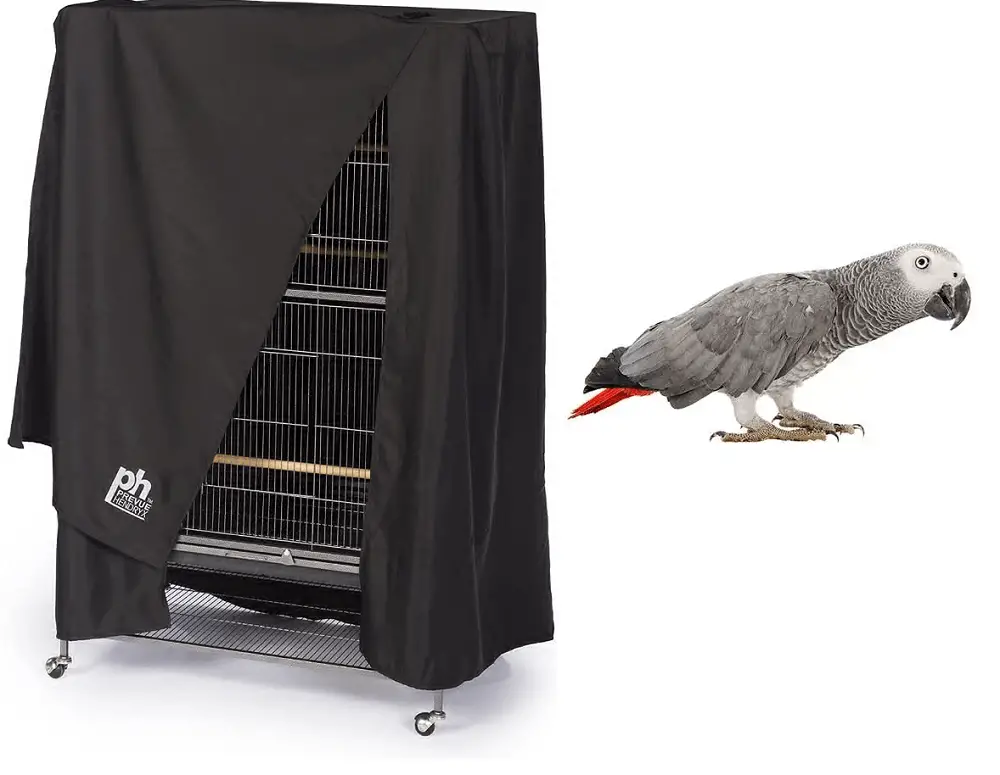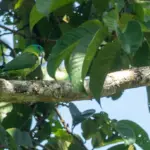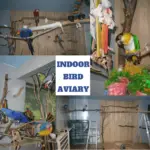
How do we answer the question, Should I cover the parrots cage at night? should I cover my birds cage at night?
It depends on the situation. Some birds prefer to stay in the open at bedtime, and others simply cannot sleep without a “safety blanket”.
On average, birds need about 12 hours of good-quality sleep each night to stay their best. Just like humans, their periods of rest can be disturbed by noise and bright light. This is why many owners choose to cover their birds at night.
Why Should You Cover Your Parrot’s Cage?

Parrots in the wild sleep or perch in holes in trees. These holes are commonly referred to as nest cavities. About 85 different bird species in North America also use nest cavities.
But there has been a problem with many species of birds due to the destruction of the habitat where they are found or creating of nest cavities. The habitats they seek are sometimes called snags, and they are mostly made up of decaying or dead trees.
These nesting cavities sometimes develop in trees from a branch that dies and falls off the tree due to decaying inside the tree. Some holes in the trees were dug by other creatures and are abandoned for various reasons.
Birds take over the abandoned nest cavity and even personalize it by chewing on the decaying wood, making it larger, or they simply settle into an abandoned hole that seems to suit them. These nest cavities are dark and protect the bird at night while providing a safe place for it to sit on the eggs and raise its young. This cavity prevents rain from falling on the bird family and protects them from the winds. It is darker than a nest on a branch.
If you think about it, then a bird’s cage or enclosure is not just an environment that protects it and ensures that it does not end up in dangerous situations when left unattended. . It is a safe place where he can rest, relax, play and have fun in a safe environment.
Using a cage cover at night mimics the nest cavity. It also shields the bird from the ambient light that is in your home and allows it to sleep without the drafts caused by air conditioning or an air purifier you might be running. Covering your bird at night can also help prevent nighttime scares.
How Do You Determine If You Should Cover Your Bird’s Cage?
If noise and light aren’t a problem, try leaving your bird uncovered for a few nights to gauge their reactions. If the bird seems to like being discovered at night, it is okay to leave it that way. However, if the bird appears lethargic or begins to show signs of stress, crankiness, or if its behavior changes in a way that is not normal, the best thing to do is to leave it covered overnight to ensure it is safe. a good night’s rest.
As long as a dark, quiet, and somewhat secluded place is provided for the bird to sleep in, most birds will be fine without being covered at night. Remember, however, that sleep is vital for the well-being of the bird. If you have any doubts about your pet’s reaction, play it safe and resume covering him at night.
Discover our cage covers by clicking on the image below.
Cover for parrot cage
Does a bird’s cage need to be covered at night?
It depends on the situation. In my experience, I have encountered birds that prefer to stay uncovered during bedtime, as well as birds that simply could not sleep without their “safety blankets”.
On average, birds need about 12 hours of good quality sleep each night to stay in optimal condition. parrot-like people, their rest periods can be disturbed by bright light and noise. Many owners choose to cover their Parrot at night.
There is a reason for that. Parrots in nature sleep or sleep in holes in trees These holes are commonly called a nest cavities. About 85 different bird species in North America also use nesting cavities.
However, many species of birds have encountered a problem due to the destruction of habitat where they locate or create nest cavities. The habitat they look for is sometimes called snags and consists mainly of decaying or dead trees.
These nest cavities sometimes grow in trees from a branch that dies and falls from the tree due to tree rot. Some holes in the trees have been dug by other creatures and are abandoned for various reasons. The birds will take over the cavity of the abandoned nest and customize it even by chewing the decaying wood and enlarging it, while simply settling into an abandoned hole that seems to suit them.
These nest cavities are dark and protect the bird at night while providing a safe place to sit on eggs and raise their young. This cavity protects the bird family from rain and protects them from winds. It is darker than a nest sitting on a branch.
So, if you think about it, a bird’s cage or enclosure is not just its environment that protects it and prevents it from putting itself in a dangerous situation when left unattended, it is its safe place to rest, relax and of course, to play and have fun in a safe environment.
Covering your bird’s cage at night mimics this nesting cavity. It also protects the bird from any ambient light in your home and allows it to sleep without drafts caused by air conditioning or an air purifier that you might have running. Covering your bird at night could also help prevent night scares.
If noise and light are not an issue, try leaving your bird uncovered for a few nights to gauge its reactions. If the bird seems to like to be discovered at night, it is acceptable to leave it like this. If, however, the bird seems lazy or begins to show signs of stress, bad mood, or if its behavior changes in a way that is not normal for it, the best thing to do is to protect it during the night so that it can sleep well.
Personally, I cover my African Greys’ cages around 8 pm. One of my birds starts to get agitated around that hour, so I know he can’t wait to go perch in his cage and call him one night. He indicates that he wants to go perching by becoming more verbal and he acts in a restless way and seems uncomfortable.
The minute I stuff him into his cage, he will drink one last glass of water in his bowl of water. By covering it, he finds his favorite perch and he settles down.
Since a bird can sleep in a dark, quiet, and somewhat secluded place, most go well without being covered at night. Remember, however, that sleep is essential to the well-being of the bird. If you have any doubts about your pet’s reaction to the discovery, get to safety and take over the cage cover at night.
Related Article:





















